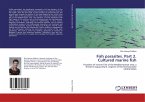Eupatorium adenophorum is considered to be a serious weed in agriculture, especially in rangelands where it often replaces either the more-desirable vegetation or native species, but also in forests. Grazing animals get accidentally exposed to the plant under scarcity conditions. It is generally unpalatable to grazing animals, but goats graze on this plant infrequently. It is fatally toxic to horses and causes the "blowing disease" in Hawaii and "Numinbah disease" or "Tollebudgera horse disease" in Australia. Toxicopathological studies were taken up in Swiss albino mice, as a model and the effects of the plant extract on immunological parameters were recorded. The results of the present studies on humoral immune responses suggest that the highest dose of the plant extract might probably be having some immune-suppressant effects on the primary (IgM) and secondary (IgG) immune responses and also some immunosuppressant effects on cell-mediated immunity (CMI) of mice.
Bitte wählen Sie Ihr Anliegen aus.
Rechnungen
Retourenschein anfordern
Bestellstatus
Storno








